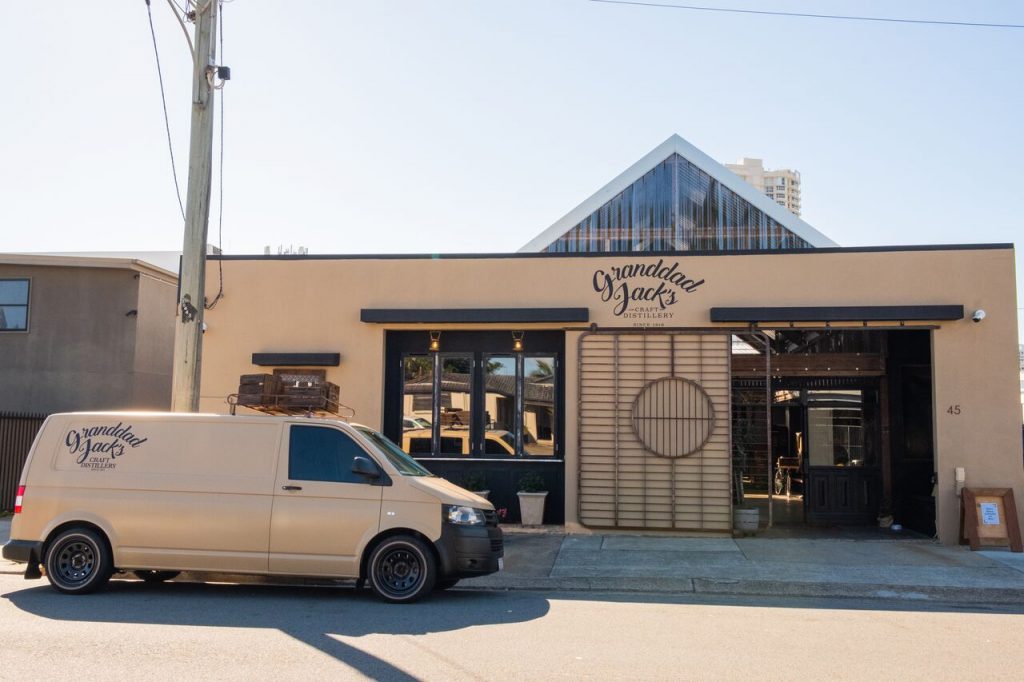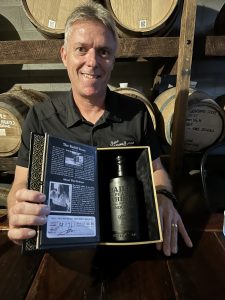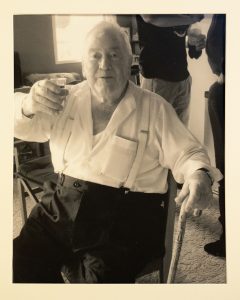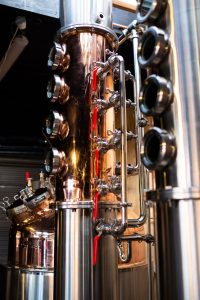
In the heart of Gold Coast, Australia, Granddad Jack’s Craft Distillery. A two-minute stroll from the bustling and picturesque Burleigh Beach, the site produces gin, whiskey, vodka, and liqueurs that ship to 10 countries.
Founder and CEO, David Ridden, got into the business because he always wanted to tell his beloved grandfather’s life story. Six years, 250,000 customers, and more than 100 international awards later, David has more than a few stories of his own.
David Ridden sat down with Spiritsfundr at his distillery to share some of the changes he witnessed firsthand in the Australian craft beverage industry, and where he thinks it’s headed next.
From pubs to casinos
For generations the neighbourhood pub was a cornerstone of the community. It was a place where the kids could play while mum and dad had a few drinks.
“They used to be a place that brought the whole community together,” Ridden recalls. “Over time they’ve changed and they’ve become mini casinos.”
This shift paved the way for neighbourhood breweries and distilleries, David notes. “People really enjoyed the sort of neighbourhood-type brewery/distillery phenomenon. They had a place where they could walk or push bike to, or it was family-friendly.”
Pioneering this shift, Ridden says, was Black Hops Brewery, whom he credits for a huge contribution to the craft beer scene in Queensland. It set the pace for a revival of neighbourhood watering holes, however, it also serves as a cautionary tale.
“It just got too big, unfortunately” Ridden laments, saying the journey from a local craft producer to an international producer is fraught with challenges.
Growing pains
The craft beverage industry thrives on innovation and dedication. It draws enthusiasts and professionals alike, seeking to convert their passion into a thriving business. However, the journey from hobbyist to successful entrepreneur is lined with pitfalls that many fail to anticipate.
Reflecting on the landscape, Ridden notes, “Usually it’s a home brewer or a home distiller that decides, ‘Oh, I’d really like to make this my career and a business’. Or someone in hospitality, ‘Oh, it would be a great hospitality opportunity’. And when you do that, you tend to not win because you don’t really know what you’re doing.”
The leap from passion to profession often comes without the necessary knowledge and skills in critical areas. “Some learn really rapidly and do an amazing job. But the reality is most of them, they might be fantastic brewers or distillers and they make great spirit, but they have no clue about marketing or managing people or building a business,” Ridden elaborates. Success in the craft beverage industry requires a balance of passion and pragmatism, creativity and commercial savvy—a balance that, unfortunately, “seldom” achieve, he says, with Australia losing breweries at a rate of about two per month.
Unlike North America, where brewery districts have become cultural and social hubs, Australia’s craft beverage Ridden says stringent council regulations and government policies have stifled opportunities for a similar model in Australia.
Join the Spiritsfundr community for exclusive insights and updates on the craft beverage industry, crowdfunding, and entrepreneurship. Subscribe now and stay ahead of the curve in the world of craft beer! 🍻
Building a brand
Ridden’s decision to start the business stemmed from a moment of inspiration at his grandfather’s 90th birthday party. His mother and sisters compiled a “This is Your Life” book, to honour the legacy of a man who had been a barber for 47 years and whose life was rich with tales worth telling.
“We literally got into the business because I’d always wanted to tell my grandfather’s life story,” Ridden explains. It was this personal narrative that laid the foundation for Granddad Jack’s. All around the distillery—and even on every bottle—customers are invited to indulge in the narrative.
This connection with consumers has enabled the business to take a different approach. From the outset, Ridden decided to avoid the conventional route many in the industry were taking. Rather than playing the volume game, which many competitors were tempted by, Ridden and his team decided to focus on a direct-to-consumer model. This decision was born out of the recognition that the traditional retail environment did not lend itself to the storytelling and brand-building they envisioned. In bottle shops, the connection between brand and consumer is often lost, making it difficult to convey the essence of what makes Granddad Jack’s unique. “The person at the bottle shop doesn’t care,” Ridden points out, highlighting the disconnect that can occur when producers target volume.
Doing more with less
Ridden’s strategy was to do more with less. By sidestepping the wholesale market, he aimed to maintain a closer relationship with customers, simultaneously sharing the story and fostering an understanding of the brand’s story and values.
This approach also made sense financially, as the high costs of excise taxes in Australia make traditional retail margins untenable for a craft distillery focused on quality. “Our model was always to go direct,” Ridden asserts, a strategy that not only allowed for better margins but set the brand apart from its competitors.
“I don’t understand why continually people come into this industry and want to do exactly what the big internationals are doing,” Ridden says. “You can’t pass them, you’re not gonna win that race.
“So from day one, we’ve always said, we’re just storytellers that happen to make good booze.”
That’s not our brand
Despite its rapid growth the complexities of the craft beverage industry eventually came to bear on Granddad Jack’s and the need for diversification became apparent. The distillery turned to the potential of export markets.
To make exports a reality, Granddad Jack’s had the opportunity to go the corporate route following an unexpected proposition from KPMG. However, wanting to stay true to their roots, the Ridden family was cautious.
“We talked about it as a family and we weren’t prepared to get into that kind of corporate foundation,” Ridden recalls, “We don’t want an equity partner that’s corporate and we don’t want to go down this corporate way of doing things. That’s not our brand. That’s not the way my grandfather would have run it, so we said no.”
Recognizing the financial and logistical challenges associated with breaking into foreign markets—described by Ridden as a “million dollar exercise”—Granddad Jack’s turned to alternative strategies to fund their ambitions.
Their answer came in the form of crowdfunding, tapping into their customer base’s support. Through communications with Black Hops Brewery, which had experience with crowdfunding, and market surveys, they gauged interest in crowdfunding. The purpose of the funds was communicated throughout to investors, focusing on international expansion and the opening of a Granddad Jack’s cocktail bar in Newcastle.
Experience with crowdfunding
Granddad Jack’s foray into crowdfunding required a delicate balancing act: restructuring of the business without compromising the family’s guiding influence. “We had to make sure that we didn’t lose control the business and it was also really important that we did a fair raise to the people that were investing,” explains Ridden.
Granddad Jack’s leveraged its direct-to-consumer model’s strength, cultivating connections with the community to create a loyal customer base, enabling them to raise significant funds without national visibility.
The crowdfunding campaign achieved “amazing results”, Ridden said, raising $700,000. The funding enabled it to expand its export operations into 10 countries, with Europe emerging as a standout market.
Lessons from Down Under
Granddad Jack’s has carved a niche in the Australian craft beverage industry thanks to its storytelling, community engagement, and strategic innovation. The success of its crowdfunding efforts demonstrates the power of a direct-to-consumer model that prioritizes deep, meaningful connections over widespread market presence. This approach has enabled them to expand their operations while also strengthening bonds with customers. By preserving the authenticity of their brand, Granddad Jack’s shows us that success lies not in the volume of sales, but in the strength of the connections forged through shared stories and values.
Ready to be part of the next big success story in the craft beverage industry? Whether you’re a seasoned craft beverage business a passionate enthusiast looking to support your first project, Spiritsfundr can help you grow an authentic brand, grow an army of loyal customers, and harvest your community capital. To learn more about how we can help, reach out to us, or book a meeting.






